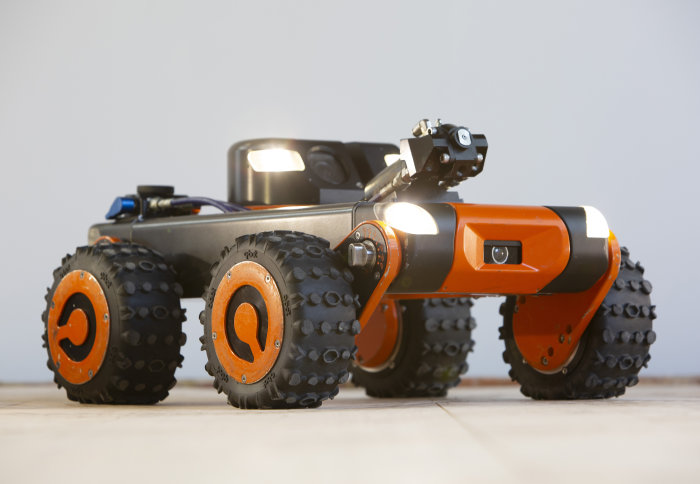Q-Bot win and exoplanet fellowship: News from the College

Here’s a batch of fresh news and announcements from across Imperial.
From an award for an Imperial-designed robot that helps insulate floors, to a new fellowship to gain a clearer picture of the atmospheres of exoplanets orbiting distant stars, here is some quick-read news from across the College.
Q-Bot win
Q-Bot, an Imperial-designed robot that helps insulate floors, has won the Queen’s Award for Innovation 2020.
The robot, which autonomously identifies and avoids obstacles and hazards, helps insulate homes by working with landlords who need affordable, fast insulation. Founded by Imperial’s Professor Peter Childs, its team includes Professor Childs and Imperial alumni and staff.
Q-Bot CEO and Imperial alum Mathew Holloway said: “We have always been driven by seeing the impact of our efforts: creating jobs; reducing carbon emissions; making homes warmer and healthier. This is why we are so pleased our achievements have been recognised with the Queen’s Award.”
Read more on the Q-bot website.
Student flips Big Bang Competition
Imperial Design Engineering undergraduate student Chris Kalogroulis has won this year’s GSK UK Young Engineer Award for his unique mechanical clock called Flip. This followed competing in the Big Bang Competition.
Chris beat thousands of other applicants to win the trophy and £2,000 prize money, which he will use to continue his STEM journey.
 He said: “Winning the Big Bang Competition has given me confidence in my product and spurred me on to take this further and I will be able to invest the prize money into launching this on Kickstarter…Hopefully, everyone at home will be using a product I’ve made in the not too distant future.”
He said: “Winning the Big Bang Competition has given me confidence in my product and spurred me on to take this further and I will be able to invest the prize money into launching this on Kickstarter…Hopefully, everyone at home will be using a product I’ve made in the not too distant future.”
Find out more about the Big Bang Competition on their website.
Prestigious professorship
 Professor Richard Thomas, from the Department of Mathematics, has been awarded a Royal Society Research Professorship, which provides long-term support for internationally recognised scientists of exceptional accomplishments. The award releases recipients from competing duties, such as teaching and administration, and allows them to focus on ambitious and original research.
Professor Richard Thomas, from the Department of Mathematics, has been awarded a Royal Society Research Professorship, which provides long-term support for internationally recognised scientists of exceptional accomplishments. The award releases recipients from competing duties, such as teaching and administration, and allows them to focus on ambitious and original research.
Professor Thomas aims to uncover surprising new insights into algebraic geometry, by identifying previously unrecognised relationships that exist between important structures in the field.
Examples of these ‘hidden symmetries’ include counts of different objects – such as solutions of different equations arising in physics – that turn out to be the same. Professor Thomas will develop conceptual explanations for these coincidences, and for more refined ‘counts’ that he will define, replacing numbers by more sophisticated algebraic objects.
Read more about the awards from The Royal Society.
Exoplanet explorer fellowship
 Dr Jo Barstow will be joining Imperial to study exoplanets thanks to a new Ernest Rutherford Fellowship, awarded by the Science and Technology Facilities Council. The five-year fellowships have been awarded to ten early-stage researchers that show clear leadership potential.
Dr Jo Barstow will be joining Imperial to study exoplanets thanks to a new Ernest Rutherford Fellowship, awarded by the Science and Technology Facilities Council. The five-year fellowships have been awarded to ten early-stage researchers that show clear leadership potential.
Dr Barstow aims to get a clearer picture of the atmospheres of exoplanets orbiting distant stars. Current methods only allow researchers to gain an ‘average’ view of the composition of exoplanet atmospheres, but we know from study of planets in our solar system that atmospheric features change over time, such as Jupiter’s great red spot gradually shrinking.
She will build computation models of light passing through atmospheres to see how measurements from space telescopes could be used to study cloudy exoplanet atmospheres that vary spatially and over time.
Read more from the Science and Technology Facilities Council.
–
Want to be kept up to date on news at Imperial?
Sign up for our free quick-read daily e-newsletter, Imperial Today.

Article text (excluding photos or graphics) © Imperial College London.
Photos and graphics subject to third party copyright used with permission or © Imperial College London.
Reporter
Madeleine Stone
Business School
Caroline Brogan
Communications Division
Hayley Dunning
Communications Division